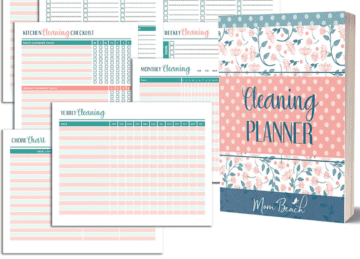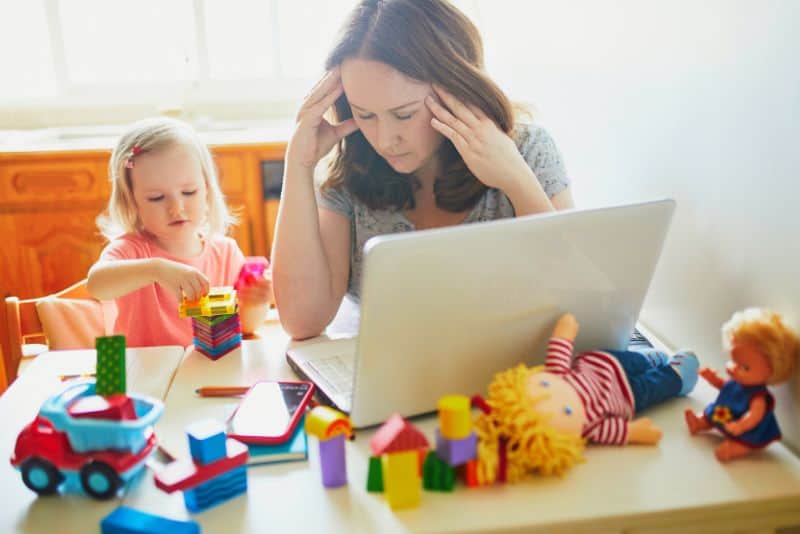Diving into the delightful yet demanding world of parenting can often feel like a rollercoaster ride, but mastering how to be a calm parent can turn that ride into a smoother, more enjoyable journey.
In our guide, we’re not just sharing tips; we’re unlocking a treasure trove of strategies designed to help you navigate the turbulent waters of parenthood with grace and humor. From handling morning madness to dealing with bedtime battles, our insights will equip you with the tools to maintain your serenity and embrace the beautiful, chaotic journey of raising little humans.
Let’s embark on this adventure together, transforming the overwhelming into the manageable and discovering the calm, composed parent within you.
How to Be a Calm Parent
#1 Morning Mantra
Start your day with a positive affirmation. It’s like giving yourself a pep talk before the kids wake up and turn your living room into a scene from a wild safari. Take a deep breath, look in the mirror, and say, “Today, I’m the queen of patience.” It might initially feel silly, but it sets a positive tone for the day. It’s your moment, even if it’s just a small moment before the cereal bowls start flying.
#2 Laugh It Off
Embrace the chaos with a good chuckle. When you find the dog mysteriously covered in glitter or your living room turned into a fort of epic proportions, try to see the humor in it. Laughter is a stress reliever and can turn a frustrating situation into a memorable story. Remember, one day, these will be the ‘good old days’ you’ll laugh about.
#3 The Timeout for Mom
It’s not just for kids! When things get overwhelming, give yourself a timeout. Step into another room, take a few deep breaths or sip your (hopefully still warm) coffee. These mini-breaks can be sanity savers, allowing you to collect your thoughts and regain composure.
#4 Soothing Sounds
Create a calming atmosphere with music or nature sounds. Whether it’s classical tunes, soft jazz, or the sound of rain, peaceful background noise can calm you and the kids. It’s like having a soundtrack for your day that says, “All is well, even if the toddler is painting the cat.”
Check out this background noise machine on Amazon!
#5 Mindful Minutes
Introduce mindfulness practices into your routine. Spend a few minutes meditating, practicing deep breathing, or sitting quietly. It’s like hitting the reset button on your stress levels. You can even involve the kids – a family meditation session could be entertaining and relaxing.
#6 Organized Chaos
Keep things somewhat organized. Now, I’m not talking about a home that looks like it’s from a magazine (because, let’s be real, that’s not happening with kids). But having some order can reduce the feeling of chaos. Maybe it’s as simple as baskets for toys or a schedule on the fridge. A little organization can bring much peace, which is a great tip for being a calm parent!
Related Posts:
- 12 Useful Tips for Parenting in the Age of Digital Technology
- 21 Ideas For Proactive Parenting to Help You Be a Better Parent
- How to Create a School Morning Routine for Busy Moms in 2024
#7 Flexible Routine
Stick to a routine, but be flexible. Routines are great for keeping things running smoothly, but sometimes, you must go with the flow. If the kids want to wear their pajamas all day or have breakfast for dinner, why not? Sometimes, breaking the routine is exactly what everyone needs.
Check out our article on creating a morning routine for busy moms!
#8 Connect with Nature
Spend time outdoors. Nature has a way of calming the soul. Whether it’s a walk in the park, a backyard picnic, or just watching the clouds, getting outside can shift everyone’s mood for the better. Plus, it’s a great way for the kids to burn off energy.
#9 Exercise Your Stress Away
Physical activity is a fantastic stress buster. It could be a yoga session, a dance party in the living room, or just chasing the kids around the yard. Exercise releases endorphins, which are natural mood lifters. Plus, it’s a healthy habit to model for your children.
#10 The Art of Delegation
Don’t be afraid to delegate tasks. Get the kids involved in household chores. It might not be perfect, but it’s about teamwork. Even small children can help with simple tasks like sorting laundry or setting the table. It teaches responsibility and takes a few things off your plate.
Check out our Cleaning Planner printable here that includes a chore chart!
#11 Positive Vibes Only
Surround yourself with positive energy. Whether it’s uplifting friends, motivational books, or inspiring podcasts, fill your life with positivity. It’s like having a personal cheer squad encouraging you through the day.
Check out the Positivity Kit by Lisa Currie!
#12 Healthy Fuel
Eat well and stay hydrated. It’s easy to forget to care for yourself when you’re busy caring for everyone else. But a balanced diet and plenty of water can improve mood and energy levels.
#13 Sleep Matters
Never underestimate the power of a good night’s sleep. It can be tough with young kids but try to get as much rest as possible. It can make a huge difference in your patience and energy, even if it means a power nap while the kids are napping or quiet time.
Check out my favorite mattress on Amazon here!
#14 Tech Timeout
Limit screen time, and that includes your own. It’s easy to get sucked into the endless scroll on social media, but it can also add to your stress. Set aside specific times for tech and stick to them. It’s amazing how freeing it can be to disconnect for a while.
#15 Learning to Let Go
Accept that you can’t control everything. Some days, the house will be a mess, dinner will be takeout, and that’s okay. Learning to let go of perfection can be incredibly liberating.
Get your home organized with our free home binder printable!
#16 Creative Outlets
Find a hobby or activity that you enjoy. Whether it’s crafting, gardening, or writing, having an outlet for your creativity can be a great stress reliever. It’s important to have something that’s just for you. I enjoy creating printables to sell in my spare time.
#17 Stay Connected
Keep in touch with friends and family. Sometimes, just talking to another adult can be a huge mood booster. Stay connected to your support network, whether it’s a phone call, a coffee date, or a quick text exchange.
#18 Practice Gratitude
Focus on the things you’re grateful for. It can be as simple as a peaceful cup of coffee in the morning or how your child’s face lights up when they see you. Focusing on the positives can help keep stress at bay.
Check out our Gorgeous Gratitude Journal printable here!
#19 Time Management
Plan your day, but be realistic about what you can achieve. Setting achievable goals can prevent being overwhelmed and help keep your day on track.
#20 Emotional Check-ins
Regularly check in with your emotions. Acknowledge how you’re feeling and remind yourself that having a range of emotions is okay. It’s all part of the parenting journey.
#21 Seek Support
Don’t be afraid to ask for help when you need it. Whether from your partner, a family member, or a professional, there’s no shame in needing support.
Don’t be afraid to ask for support when it comes to helping kids with homework. Tutor Map is an amazing site that will match you with expert tutors for your kids and teens.
#22 Breathing Exercises
Practice breathing exercises to calm your mind. Even a few deep breaths can help reset your stress levels and bring a sense of calm.
#23 Quality Time
Spend quality time with your children. It’s not always about the quantity of time but the quality. Even a short, focused play session can strengthen your bond and improve everyone’s mood.
#24 Reading Relaxation
Read a book or listen to an audiobook. It’s a great escape and can be very relaxing. It’s even better if you can read with your kids. This is one of the many ways to be a calm parent.
A great read is “Things We Never Got Over” by Lucy Score on Amazon!
#25 Limit Multitasking
Try to focus on one task at a time. Multitasking can make you feel more stressed and less productive. Focusing on one thing can help you feel more accomplished and less frazzled.
#26 Stay Present
Try to live in the moment. It’s easy to worry about the future or dwell on the past, but focusing on the here and now can reduce stress and increase happiness.
#27 Embrace Imperfection
Accept that not everything will be perfect. There will be messes, mistakes, and mishaps. It’s all part of the parenting journey.
#28 Hygge Your Home
Create a cozy and comfortable environment. Whether it’s soft blankets, scented candles, or a warm cup of tea, a cozy atmosphere can help you feel more relaxed and at peace.
Check out the softest and cuddliest blanket ever on Amazon!
#29 Celebrate Small Victories
Acknowledge and celebrate the small wins, both yours and your kids’. It could be as simple as getting everyone out the door on time or your child putting away their toys without being asked.
#30 Journaling Joy
Keep a journal. Writing down your thoughts and feelings can be a great way to process them and reduce stress.
Check out this amazing journal I use myself that I bought on Amazon!
#31 Remember the Love
Lastly, and most importantly, remember why you’re doing all this. The love for your children is what makes all the craziness worth it. On tough days, just a hug or a smile from your little one can remind you of the joy in parenting.
What is the Most Stressful Age for Parents?
The most stressful age for parents can vary greatly depending on both the parent and the child, as different stages of a child’s development come with unique challenges. However, many parents find the toddler years (around ages 1-3) and the teenage years particularly demanding.
- Toddler Years: This phase is often marked by significant milestones in a child’s development, including walking, talking, and potty training. Toddlers are known for their boundless energy and curiosity and, famously, for asserting their independence, often leading to the “terrible twos,” which can be challenging for parents. Toddlers have strong emotions but lack the language skills to express themselves effectively, leading to frustration and tantrums.
- Teenage Years: The teenage years are another commonly cited stressful period for parents. Adolescents undergo major physical, emotional, and social changes. They seek more independence, may challenge authority, and can be more emotionally volatile. This period can also bring concerns about academic performance, peer pressure, and issues around boundaries and discipline.
It’s important to remember that stress levels can also be influenced by external factors such as the parent’s support system, work pressures, financial stability, and any special needs or health issues in children. Each family’s experience is unique, and a highly stressful age for one parent could be a less stressful one for another.
What are 5 Positive Parenting Skills?
Why Am I So Stressed As a Parent?
Feeling stressed as a parent is a common experience, and it’s important to acknowledge that you’re not alone in feeling this way. Parenting is an incredibly demanding role, and stress can stem from a variety of sources:
- Constant Responsibility: Parenting is a 24/7 job with no breaks. The constant responsibility for the well-being and development of your child can be overwhelming, especially when balanced with other responsibilities like work, household chores, and personal commitments.
- Lack of Sleep and Personal Time: Many parents struggle with getting enough sleep, which is crucial for managing stress. Additionally, finding time to relax or engage in activities you enjoy can be challenging, leading to constantly feeling ‘on duty.’
- Financial Pressures: Raising children can be expensive, and financial concerns, such as education, healthcare, and daily living expenses, can add significant stress.
- Behavioral Challenges: Children may go through challenging behavior phases depending on their age and temperament. Dealing with tantrums, sibling rivalry, or teenage rebelliousness requires a lot of patience and energy.
- Social and Cultural Expectations: There’s often pressure to be the ‘perfect parent’, which can be exacerbated by social media, where people tend to share only the best parenting moments. Comparing yourself to these idealized versions can be disheartening.
- Personal Expectations: You might have high standards for yourself as a parent, and when things don’t go as planned, it can lead to feelings of inadequacy or failure.
- Relationship Changes: Parenting can change the dynamics of your relationships, including your partnership with a significant other, leading to stress if not managed effectively.
- Child’s Needs: If your child has special needs, health issues, or learning difficulties, the additional care and advocacy they require can be taxing both emotionally and physically.
- Lack of Support: A strong support system is vital. Parenting can feel isolating and daunting without reliable help from family, friends, or community resources.
Recognizing that feeling stressed doesn’t mean you’re failing as a parent is crucial. Parenting is tough, and stress is a natural response to the high demands of this role. It’s important to seek support, whether talking to friends, joining a parenting group, or seeking professional help. Taking care of your well-being is not a luxury but a necessity for you and your children. Remember to be kind to yourself and acknowledge the hard work you’re doing every day.
More Ways on How to Be a Calm Parent?
As we wrap up our journey through the diverse landscape of parenthood, it’s clear that understanding how to be a calm parent is less about perfection and more about embracing the ebbs and flows of family life. With these 31 strategies, from mindful mantras to laughter-filled moments, you’re now equipped to face parenting challenges with renewed peace and positivity.
Remember, the path to tranquility in parenting is a journey, not a destination. Each day brings new opportunities to practice patience, show kindness to yourself, and celebrate the small victories. Keep these tips close to your heart, and watch as the calm, confident parent within you flourishes amidst the beautiful chaos of raising children.
Do you have ideas on how to be a calm parent? Have you tried any of these 31 ways? Let us know in the comments.
Related Posts:
- 12 Useful Tips for Parenting in the Age of Digital Technology
- 21 Ideas For Proactive Parenting to Help You Be a Better Parent
- How to Create a School Morning Routine for Busy Moms in 2024
Pin to Pinterest:
Pin to Pinterest so other moms can find out about how to be a calm parent too.










Leave a Reply